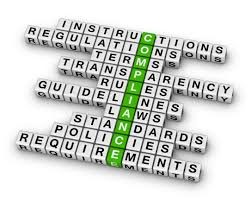Compliance Registers
So, what is a compliance register? I hear you asking and how could I/My Company possibly benefit from it? Well from a dictionary definition compliance means to conform, conform to a rule, a specification, a regulation, a standard or a law. Wow, that’s a lot of conforming! From an environmental perspective, in all sectors, this type of conformance is a typical daily exercise, from internal management plans, to licence conditions and legislation, this amounts to hundreds, possibly thousands of dos and don’ts that must be accounted for.
To create a compliance register is to wrap all of these dos and don’ts up into a neat package. I say a neat package but these documents can be huge! When starting a compliance register, it is hard to believe just how many rules, regulations and commitments a company can have, but to have a register is to have it all at your fingertips, to be able to check and implement compliance, without having to read through hundreds of documents stored in that dreaded filing cabinet in the corner of the room, or lost forever, never to be found again although you are sure you only had it in your hands last week.
Types of Compliance Register

Compliance registers can be made to fit you, they can be made to focus on instructions and rules; standards and guidelines; requirements and agreements or the hard-hitting policies, regulations and laws, but let’s focus on an environmental perspective.
So what are some of the actual documents you will be looking through to go into your register? They can be anything from a document compiled to submit an approval such as a Mining Proposals, NOI’s, Management Plan, Strategy or they are the specific authorisation obtain from a government authority such as Ministerial Statement, Permits, Licences, or Letter of Approvals, and lastly the relevant Acts, Regulations, Code of Practice, Agreements, Deeds and government guidance or guidelines.
From these documents come the obligations, this can be a commitment (e.g. monitoring activity, area avoidance), an activity constraint (e.g. extraction limits, stockpile/waste dump heights) or a legal requirement (e.g. breach notification, licence obligation, record keeping).
Starting a Compliance Register
In a perfect world, your compliance register would start at the planning phase of the project. As soon as that first regulating document came in, you would read through it, extract the obligations and put it in you register, perfect. Unfortunately most projects have been long running, extended, adjusted and amended, however, it is still never too late to start your register. Outsourcing is a great way to get your register sorted as there can be 100+ hours needed to source documents, read through and extract obligations, organise, structure and format your register.
If you need assistance developing a Compliance Register or simply feel it is time for a third-party review, we can help.
enquiries@integratesustainability.com.au or +618 9468 0338
